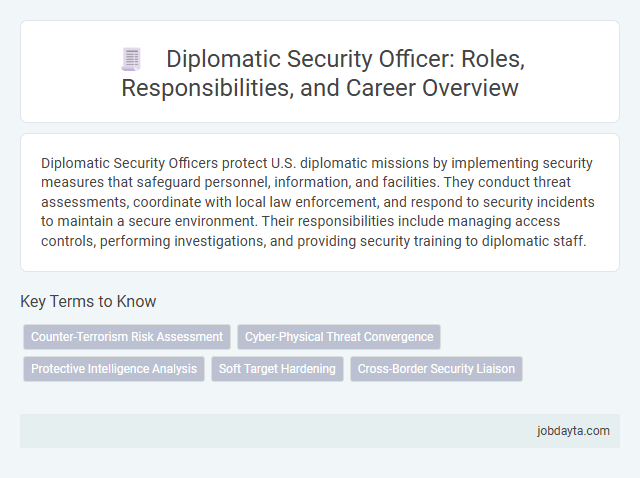Diplomatic Security Officers protect U.S. diplomatic missions by implementing security measures that safeguard personnel, information, and facilities. They conduct threat assessments, coordinate with local law enforcement, and respond to security incidents to maintain a secure environment. Their responsibilities include managing access controls, performing investigations, and providing security training to diplomatic staff.
Introduction to Diplomatic Security Officer
A Diplomatic Security Officer (DSO) plays a crucial role in safeguarding U.S. diplomatic missions worldwide. These professionals are responsible for protecting personnel, facilities, and sensitive information in high-risk environments.
DSOs undergo specialized training in law enforcement, counterterrorism, and risk management. Their work ensures the safety of diplomats and supports the mission of the U.S. Department of State.
Key Roles and Responsibilities
Diplomatic Security Officers are responsible for protecting U.S. diplomatic missions, personnel, and information worldwide. They conduct risk assessments, implement security measures, and respond to security incidents to ensure the safety of embassies and consulates. These officers collaborate with host nation law enforcement and intelligence agencies to maintain secure environments and support U.S. foreign policy objectives.
Essential Skills and Qualifications
Diplomatic Security Officers play a critical role in protecting U.S. diplomacy personnel and facilities worldwide. Their essential skills and qualifications ensure the effective execution of security operations in diverse and high-risk environments.
- Physical Fitness - Officers must maintain excellent physical condition to perform demanding security and emergency response tasks.
- Security Expertise - In-depth knowledge of threat assessment, counterterrorism, and protective security protocols is vital.
- Communication Skills - Clear and effective communication supports coordination with international agencies and internal teams.
Strong problem-solving abilities and cultural awareness round out the core competencies required for Diplomatic Security Officers.
Training and Certification Process
Diplomatic Security Officers undergo rigorous training designed to prepare them for complex global security challenges. The training curriculum covers threat assessment, protective operations, and emergency response tactics.
Certification requires completion of the Federal Law Enforcement Training Center program and passing specialized security exams. Your successful certification ensures readiness to protect U.S. diplomats and facilities worldwide.
Daily Duties in Diplomatic Security
| Role | Diplomatic Security Officer |
|---|---|
| Primary Focus | Daily Duties in Diplomatic Security |
| Key Responsibilities |
|
| Daily Activities |
|
| Importance of Your Role | Your efforts maintain the safety of diplomatic missions and ensure the continuity of U.S. foreign relations through a secure environment. |
Challenges Faced by Diplomatic Security Officers
Diplomatic Security Officers operate in complex environments that demand vigilance and adaptability. Their role involves ensuring the safety of diplomatic missions while navigating diverse threats and cultural dynamics.
- High-Risk Environments - Officers often work in regions with political instability, increasing personal danger and operational challenges.
- Counterterrorism Responsibilities - They must identify and prevent threats from terrorist groups targeting diplomatic personnel and facilities.
- Balancing Diplomatic Sensitivities - Officers must protect missions without compromising diplomatic relations or cultural respect.
Career Path and Advancement Opportunities
A Diplomatic Security Officer plays a critical role in protecting U.S. diplomats, facilities, and sensitive information worldwide. Career advancement opportunities include specialized training, leadership roles, and assignments in high-risk locations, enhancing professional expertise. You can progress by gaining experience, earning certifications, and demonstrating strong leadership and problem-solving skills.
Impact of Diplomatic Security on Foreign Relations
Diplomatic Security Officers play a crucial role in safeguarding diplomats and foreign missions, ensuring stable international relations. Their efforts protect national interests and promote peaceful diplomatic engagement worldwide.
By preventing security breaches and managing risk, these officers create a secure environment for diplomatic dialogue. Their work directly influences the confidence and trust between nations. Your safety and success in foreign relations depend significantly on their dedication and expertise.
Salary and Benefits Overview
Diplomatic Security Officers receive competitive salaries reflecting their critical role in protecting U.S. diplomats and facilities worldwide. Their compensation includes a range of benefits designed to support both professional and personal well-being.
- Base Salary - Salaries typically range from $50,000 to over $90,000 annually depending on experience and location.
- Overseas Allowance - Officers assigned abroad receive cost-of-living adjustments and hardship pay to offset challenging environments.
- Comprehensive Benefits - Includes health insurance, retirement plans, paid leave, and access to training opportunities.
Future Trends in Diplomatic Security Careers
What are the emerging trends shaping the future of Diplomatic Security Officer careers? Advancements in technology are transforming security protocols and risk assessment strategies within diplomatic missions. Increasing geopolitical complexities demand specialized skills in cyber defense, intelligence analysis, and crisis management for security officers.
Related Important Terms
Counter-Terrorism Risk Assessment
Diplomatic Security Officers conduct comprehensive counter-terrorism risk assessments to identify potential threats against diplomatic missions and personnel worldwide. These evaluations incorporate intelligence analysis, threat modeling, and strategic planning to implement protective measures that mitigate risks posed by terrorist organizations and lone actors.
Cyber-Physical Threat Convergence
Diplomatic Security Officers are increasingly addressing the convergence of cyber and physical threats by integrating advanced cybersecurity measures with traditional protective operations to safeguard embassies and personnel. This hybrid approach enhances resilience against coordinated attacks that exploit vulnerabilities in both digital infrastructure and physical security systems.
Protective Intelligence Analysis
Diplomatic Security Officers specializing in Protective Intelligence Analysis gather and assess critical threat information to ensure the safety of U.S. diplomatic personnel and facilities worldwide. They utilize advanced analytical techniques and intelligence sources to identify potential risks, enabling proactive measures against espionage, terrorism, and hostile actions targeting American interests.
Soft Target Hardening
Diplomatic Security Officers implement soft target hardening by enhancing physical barriers, increasing surveillance, and conducting risk assessments at embassies and consulates to protect personnel and visitors. Their strategic measures reduce vulnerabilities in public areas, preventing attacks on diplomats and mission facilities worldwide.
Cross-Border Security Liaison
Diplomatic Security Officers specializing in Cross-Border Security Liaison coordinate intelligence sharing and risk assessments between countries to prevent threats against diplomatic missions. Their role enhances international cooperation by aligning security protocols and facilitating timely communication during transnational incidents.
Diplomatic Security Officer Infographic

 jobdayta.com
jobdayta.com